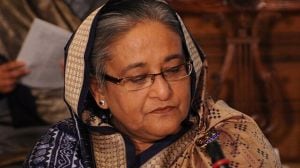It’s a VHP election in Gujarat
Rarely has a state election acquired such a national dimension as has Gujarat. The outcome will decide the quantum of freedom and flexibilit...

Rarely has a state election acquired such a national dimension as has Gujarat. The outcome will decide the quantum of freedom and flexibility Prime Minister Vajpayee will have to take decisions in the coming months.
In fact, the PM’s trip to Islamabad appears to hinge on the arithmetic of the results. Though Vajpayee has hinted he may not go to the SAARC meet, much will depend, say South Block mandarins, on whether the post-Gujarat situation allows the PM to sell the trip to his party.
Similarly, the Centre’s Kashmir policy will unfold only after December 15. This was apparently conveyed to Jammu and Kashmir Chief Minister Mufti Mohammed Sayeed when he was in the capital recently.
The result, either way, could create problems for the deputy prime minister also. A BJP defeat in Advani’s home state would not reflect well on him, although a deflated VHP would provide some respite to Vajpayee. But victory too might be problematic for Advani. The credit for it would go to Hindutva’s new icon: Modi. It is Modi who has drawn crowds in Gujarat; it is Modi who determinedly kept Haren Pandya out of the election even though Advani wanted him to get a ticket; it was Modi, not the party high command, who decided on the speakers who would make a difference in Gujarat. It is Modi who is being billed by the VHP as the BJP’s future prime ministerial candidate. A BJP victory in Gujarat would herald a generational change in the party in the real sense. Such a situation may compel Advani and Vajpayee to work together closely. They may suddenly find that they need each other more than they have done in the recent past.
Of course, Gujarat will fashion the BJP’s politics for the 2003 assembly elections and the 2004 Lok Sabha polls. It would also determine the response of the Congress and the extent to which it will opt nationally for its latest ‘soft Hindutva’ image in order to defend itself against the charge that it is anti-Hindu and pro-minority. The BJP’s defeat could herald a slow fadeout for the party. In the immmediate future, the party might return to the Vajpayee line, though the tussle between the organisation and the Sangh would sharpen.
A BJP victory could have another effect. If victorious, the BJP will be under increasing pressure to experiment with the VHP’s laboratory logic in other states which are going to the polls next year. The party might latch onto issues like religious conversions. In competitive politics, communal polarisation may be easier in states where the BJP is pitted directly against the Congress than where the fight is triangular or a four-cornered one. It did not work in UP or in Jammu in the recent polls there, and the BJP came a cropper in both places.
On the other hand, the situation may ease in Gujarat, where emotions have run high since February. The compulsions of a victorious Modi would be to strike a more sober and moderate note. He would be called to demonstrate that he can govern. He would have to contend with international pressure against fundamentalism. Continuing religious mobilisation will only add to his problems.
His real problems, however, are likely to come not so much from ‘Mian Musharraf’ or a Congress determined to view things through ‘Italian glasses’ but from another quarter. He would have to contend with an emboldened VHP, which is also becoming the enfant terrible of the Sangh. The VHP has tasted blood, and will want to do backseat driving. Make no mistake, it is a VHP election in Gujarat. And Modi is more a symbol of the VHP than the BJP. When the chips are down, it is really a fight between the VHP and the Congress in the state’s tribal areas which may finally decide which way the pendulum swings.
Godhra and its aftermath have transformed Gujarat. It terrorised the Muslims and alienated a large section of the Hindus. Modi’s politics have played on the sense of fear in both communities to such an extent that the entire election is centred on him. At the time of writing, pollsters are predicting a neck and neck race.
While there is nothing new about politicians resorting to emotive issues, the Gujarat elections reveal just how distant the politician is becoming from the needs of the people.



- 01
- 02
- 03
- 04
- 05




























